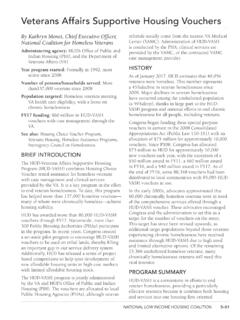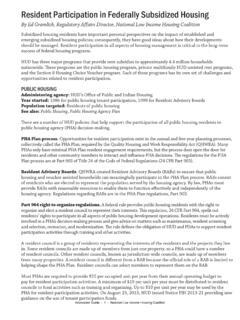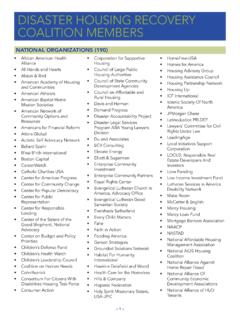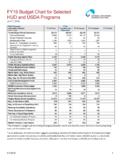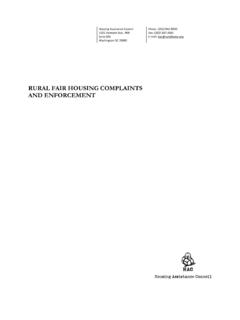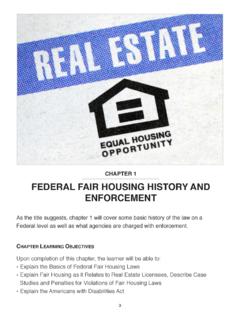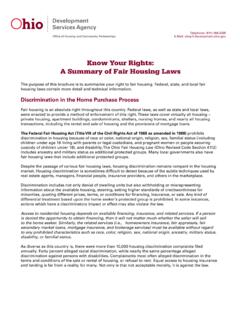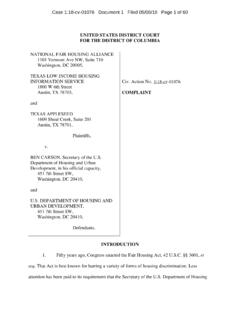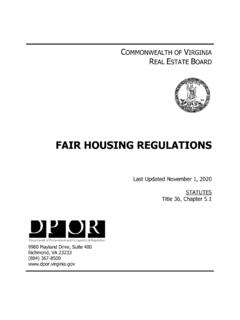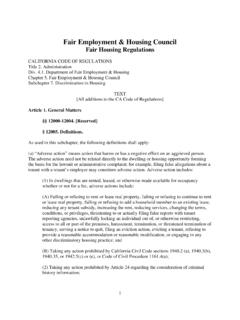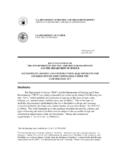Transcription of Fair Housing Programs - nlihc.org
1 5 1 NATIONAL LOW INCOME Housing COALITIONBy Jorge Andres Soto, Director of Public Policy, National fair Housing AllianceAdministering agency: HUD s Office of fair Housing and Equal Opportunity (FHEO)Year program started: 1989 Number of persons/households served: In 2014 and 2015, organizations funded by the fair Housing Initiatives Program (FHIP) investigated 38,671 complaints of Housing discrimination. Population targeted: Protected classes race, national origin, color, religion, sex, familial status, and disabilityFY17 funding: FHIP, $ million; fair Housing Assistance Program (FHAP), $ million through April 28, 2017. Also see: Affirmatively Furthering fair HousingThe federal fair Housing Act protects individuals and families from discrimination on the basis of race, national origin, color, religion, sex, familial status, and disability in all Housing transactions, public and private. HUD has also provided guidance that interprets the fair Housing Act s prohibition on sex discrimination to prohibit discrimination based on sexual orientation or gender identity in HUD-assisted Housing and Housing insured by the Federal Housing Administration.
2 Two HUD-funded Programs are specifically dedicated to the enforcement of the fair Housing Act: FHIP and FHAP. ADMINISTRATIONFHEO is responsible for administering FHIP, FHAP, and HUD s investigation of fair Housing and fair lending complaints. The Civil Rights Division of the Department of Justice (DOJ) may also investigate complaints and is responsible for litigating on behalf of the federal government in cases of fair Housing and fair lending violations. DOJ also retains exclusive fair Housing authority over complaints involving zoning and land use, and pattern and practice cases. HISTORY AND PURPOSEThe federal fair Housing Act was passed in 1968 and amended in 1974 and 1988. FHIP and FHAP were created as a means of carrying out the objectives of the Act. Programs SUMMARY There are two federal Programs dedicated solely to assist in the enforcement of the fair Housing Act. FHIP funds private fair Housing organizations, and FHAP funds the fair Housing enforcement Programs of state and local government agencies.
3 fair Housing Initiatives Program. FHIP supports private nonprofit fair Housing organizations in their efforts to provide education and outreach to the public and Housing providers, and to enforce the fair Housing Act by investigating allegations of rental, sales, homeowner insurance, and lending discrimination in their local Housing markets. FHIP is a competitive grant program administered by FHEO. FHIP supports three primary activities: The Private enforcement Initiative enables qualified private nonprofit fair Housing organizations to conduct complaint intake, testing, investigations, and other enforcement activities. The Education and Outreach Initiative funds organizations to educate the general public about fair Housing rights and responsibilities, and local Housing providers about how to comply with the law. The fair Housing Organizations Initiative builds the capacity and effectiveness of fair Housing organizations, and funds the creation of new organizations.
4 In 2014 and 2015, FHIP-funded organizations investigated 38,671 complaints of Housing discrimination across the country for families and communities, more than twice that of all state and federal agencies combined, and over three times as many as local and state government agencies participating in HUD s FHAP program combined during the same period. fair Housing Assistance Program. State and local government agencies certified by HUD to enforce state or local fair Housing laws that are substantially equivalent to the fair Housing Act receive FHAP funds. HUD funds FHAP agencies by reimbursing them based on the number of cases they successfully process. In addition, FHAP funds help cover administrative expenses and training. New FHAP organizations receive three years of fair Housing Programs5 2 2017 ADVOCATES GUIDE capacity building funding before moving to the reimbursement phase. In 2014 and 2015, FHAP entities investigated 13,254 complaints. FUNDINGP resident Obama proposed $46 million for FHIP, and $ million for FHAP for FY17.
5 Congress in December 2016 funded FHIP and FHAP at the FY16 level at $ million, $900,000 below FY15. FHAP received a $1 million increase to $ million in FY17 from FY15, despite a drop in the number of participating agencies. At least $57 million, including $5 million for a systemic testing program, must be provided for the FHIP program going forward. FHAP must be funded at $40 million. An increased FHIP appropriation would provide fair Housing groups with the capacity to address larger systemic issues, such as discriminatory sales practices, insurance policies, and bringing about investigations into increasingly harmful blanket policies that have a widespread impact on available Housing choice in entire markets. FHIP must also be increased to allow for private nonprofit fair Housing organizations to address the onslaught of discrimination against immigrants and religious minorities instigated by the hateful rhetoric of the 2016 presidential campaign.
6 FORECAST FOR 2017 Conservative members of Congress continue to attack enforcement of the fair Housing Act, and will likely again target HUD s Affirmatively Furthering fair Housing rule and funding for the FHIP program s private enforcement component. The same conservative members of Congress may also try to direct HUD to focus funding on education and outreach instead of enforcement grants. Such a drastic shift in priorities would put many fair Housing organizations out of business, forcing victims of discrimination to rely on state agencies and HUD under an administration that is hostile to fair Housing . Advocates should support increased fair Housing funding and urge HUD to prioritize private enforcement grants under the FHIP program. Private fair Housing organizations remain a critical part of the United States civil rights enforcement infrastructure. In 2016, private nonprofit fair Housing organizations investigated 19,645 (70%) fair Housing complaints, more than twice as many complaints as all federal, state, and local government agencies combined.
7 Public FHAP agencies processed 6,972 (25%) complaints and HUD processed 1,274 ( ) FOR LOCAL SUCCESSI ndividuals and advocates who suspect or observe a fair Housing violation, including a failure to affirmatively further fair Housing , should contact a local fair Housing organization or the National fair Housing Alliance at 800-910-7315, or see a list of fair Housing organizations under Find Local Help at fair Housing complaints can be filed with local fair Housing organizations, state or local government agencies, or HUD. Individuals who experience hate crimes in a dwelling should call the local authorities, but they should also reach out to their local fair Housing organization or the National fair Housing Alliance. The fair Housing Act s criminal section provides victims of certain hate crimes at their place of dwelling. Advocates working with distressed homeowners who believe they may have been victims of lending discrimination should encourage borrowers to submit mortgage complaints to the Consumer Financial Protection Bureau (CFPB).
8 Individuals and advocates may submit mortgage complaints by visiting or by calling 855-411-CFPB (2372). Non-English speakers can receive information and submit mortgage complaints in any one of 200 languages by calling the CFPB. WHAT TO SAY TO LEGISLATORSA dvocates should speak to legislators with the message that private fair Housing organizations investigate more than two-thirds of all fair Housing complaints each year twice as many as all government agencies combined. This important service is historically underfunded, and as a result fair Housing and fair lending violations remain under-reported and unaddressed. To help put an end to pervasive Housing discrimination, funding for FHIP should be at least $57 million, including $5 million for a systemic testing program, and funding for FHAP should be $40 million going forward. 5 3 NATIONAL LOW INCOME Housing COALITIONL egislators must also be prepared to protect HUD s Affirmatively Furthering fair Housing regulation.
9 FOR MORE INFORMATIONN ational fair Housing Alliance, 202-898-1661, 800-910-7315.
